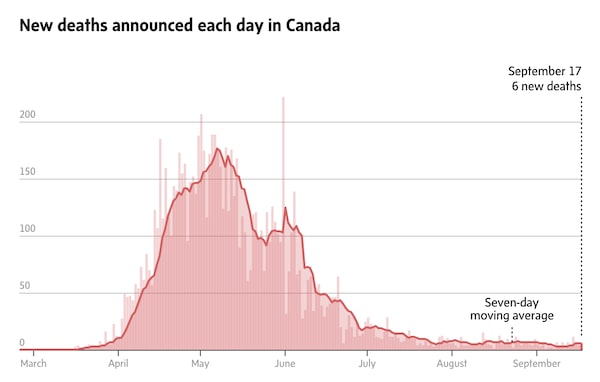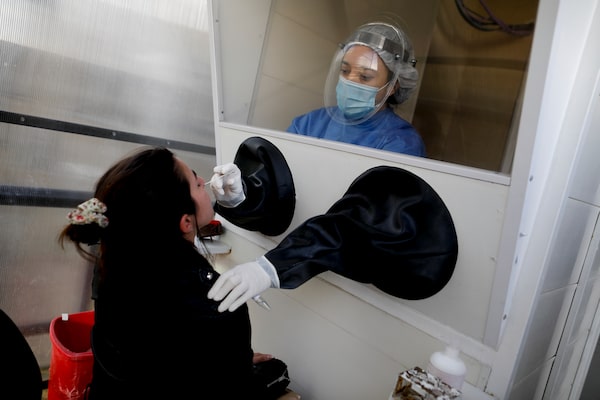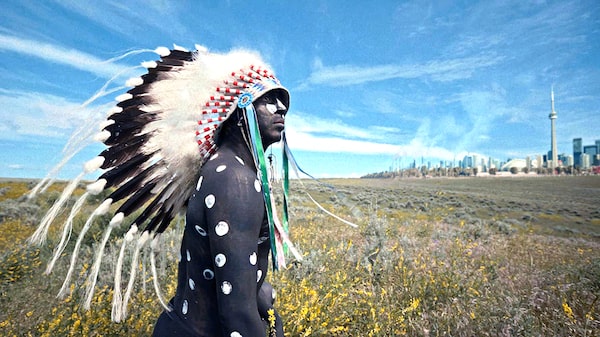Good evening, here are the coronavirus updates you need to know tonight.
Top headlines:
- Canada could lose control of pandemic because of a worrying recent spike in new cases, Tam says
- Globe analysis finds families in more racialized or low-income neighbhourhoods less likely to send kids back to class
- B.C. unveils $2-billion economic plan amid fevered snap-election speculation
In Canada, there have been at least 140,867 cases reported. In the past week 5,963 new cases were announced, 35-per-cent more than the previous week.
There have also been at least 9,200 deaths. Today, six deaths were reported, compared to five that were recorded yesterday.

The Globe and Mail
Worldwide, there have been at least 29,764,055 cases confirmed and 939,473 deaths reported.
Sources: Canada data is compiled from government websites, Johns Hopkins and COVID-19 Canada Open Data Working Group; international data is from Johns Hopkins University.
Coronavirus explainers: Coronavirus in maps and charts • Lockdown rules and reopening • Mask-wearing rules • Back to school guide • Essential resources
Number of the day
1 in 4
A survey of more than 6,700 credit cardholders found almost 25 per cent of users could not make payments in May in June.
- However, since the J.D. Power survey was fielded in May and June, other data have shown households are resuming monthly payments.
- By the end of July, the average deferral rate for personal loans and credit cards at the Big Six banks fell to 4.3 per cent, down from 9.6 per cent in April, according to RBC.
Photo of the day

Healthcare worker Mariela Jacobo conducts a nasal swab test for COVID-19 from inside a freestanding coronavirus testing isolation booth, at the Posadas hospital, in Buenos Aires, Argentina, Thursday, Sept. 17, 2020. (AP Photo/Natacha Pisarenko)Natacha Pisarenko/The Associated Press
Coronavirus in Canada
- Starting Friday in Ontario, restrictions on gatherings will be tightened in Toronto, Peel Region, and Ottawa, with caps on social gatherings reduced to 10 people inside and 25 outside. Meanwhile, students in more racialized areas are less likely to return to in-person learning. And, Western University shut down athletics and recreational clubs after an outbreak, while officials at Queen’s University are sounding the alarm in response to parties that flaunt restrictions.
- Quebec hopes a new, tougher advertising campaign will help convince skeptics to take COVID-19 seriously, as it reports almost 500 new cases today.
- Yesterday, officials in British Columbia said health authorities will publish data on which schools have COVID-19 cases. The province will invest more than $2-billion in an economic-recovery plan that aims to avert additional job losses because of the pandemic.
In Ottawa, Conservative Leader Erin O’Toole says the federal government has not done enough to improve rapid COVID-19 testing as thousands face long waiting times of up to six hours at testing sites across the country.
- Yesterday, O’Toole and his family were tested for coronavirus after an aide was found to be positive for COVID-19. The Bloc Québécois leader is also in isolation because of a similar risk.
- Today, the Conservative leader said Prime Minister Justin Trudeau “must answer for why we do not have access to more of the tests our allies are using.” The United States, for example, has approved two rapid tests that can return results in as little as 15 minutes.
- Yesterday, Federal Health Minister Patty Hajdu said the government is reviewing applications for rapid-testing devices – such as the antigen tests used for other viruses – but will not approve them until they meet Canada’s standards for accuracy.
Yesterday, with the House set to return for a Speech from the Throne next week, the Prime Minister defended the move toward remote voting
Also today: Canada could lose its ability to manage the pandemic because of a worrying recent spike in new cases, Chief Public Health Officer Dr. Theresa Tam said.
Coronavirus around the world
- Like other conspiracy theorists, Robert F. Kennedy Jr., son of Robert F. Kennedy and nephew of former U.S. president John F. Kennedy, has gained popularity during the COVID-19 pandemic by adapting his anti-vaccine messages to fit the crisis, firing off false allegations against Microsoft founder Bill Gates and about the safety of 5G telecom networks.
- Hundreds of workers at COVID-19 laboratories in France went on strike on Thursday, a trade union said, angry over poor working conditions as the coronavirus testing system buckles under huge demand.
- The WHO’s top emergency expert said it was important for all countries to have “consistent messaging” for their public. His claim came after Donald Trump took exception to comments from the director of the U.S. Centers for Disease Control and Prevention, Robert Redfield, who said a vaccine could be broadly rolled out in mid-2021 and masks might be more effective.
- Watch: Australia reported its lowest one-day rise in new COVID-19 cases in nearly three months, as states said restrictions imposed to slow the spread of the virus will be further relaxed.
Coronavirus and business
The condo market in Canada’s big cities is the most vulnerable post-COVID-19 slump, for a variety of reasons including declining immigration and a softer rental market.
- A sales slump would be a major change for the condo market, which started 2020 with price increases outpacing that of detached houses. However, since March both price growth and sales activity for condos have trailed other market segments.
Condo sales could change in coming month, on a host of factors, among them the speed of economic recovery and the severity of a potential second wave.
And: U.S. airline CEOs plead with White House to avert looming job cuts
Globe opinion
Gary Mason: “Not surprisingly, Mr. Kenney was nonplussed by the dire forecasts, repeating his mantra that there would be huge demand for oil and gas well into the future, and that Alberta would be well-positioned once the pandemic was over and once his predicted global supply crunch takes hold.”
Distractions

Inconvenient Indian (2020). Based on Thomas King’s award-winning 2012 study, The Inconvenient Indian: A Curious Account of Native People in North America, Michelle Latimer’s documentary examines the ongoing colonization of Indigenous peoples in North America. If early colonization depended on force, in more recent decades it has focused on Indigenous history, culture, and traditions. Courtesy of TIFFCourtesy of TIFF
🎬 For the cinephile: The best, worst and weirdest moments of TIFF 2020
Before we bid a virtual adieu to Zooming celebrities, chilly drive-ins and so many online screenings, The Globe and Mail’s film festival writers present the high- and low-lights from an unprecedented festival.
Information centre
- Rob Carrick’s 10-point checklist of things you should have done by now to protect or improve your money situation. Tips for minimizing damage to your credit score; how to manage retirement anxiety during difficult times; and things to think about if you’re considering home delivery.
- Here are the expectations for self-isolation; tips for managing anxiety and protecting your mental health; and what to do if you think you have the virus. Wash your hands. How to break a bad habit (like touching your face). Is flying safe?
- The best foods to eat to maintain an immune system-friendly diet; and how to keep a healthy diet while working from home; four eating tips when working from home; and five mistakes that might cause you to gain unwanted weight. Here are the essentials to stock up on and how to shop safely for groceries; the best pantry staples and how to stop stress-eating. What to cook with rhubarb (aside from pie).
- Here’s what you should do if you are newly laid off; how to apply for CERB, EI, and other financial benefits; how the CRA might identify CERB fraud; and other coronavirus and employment questions answered. What to do if your employees don’t return to work because they want to collect CERB.
What are we missing? Email us: audience@globeandmail.com. Do you know someone who needs this newsletter? Send them to our Newsletters page.
 Jessie Willms
Jessie Willms